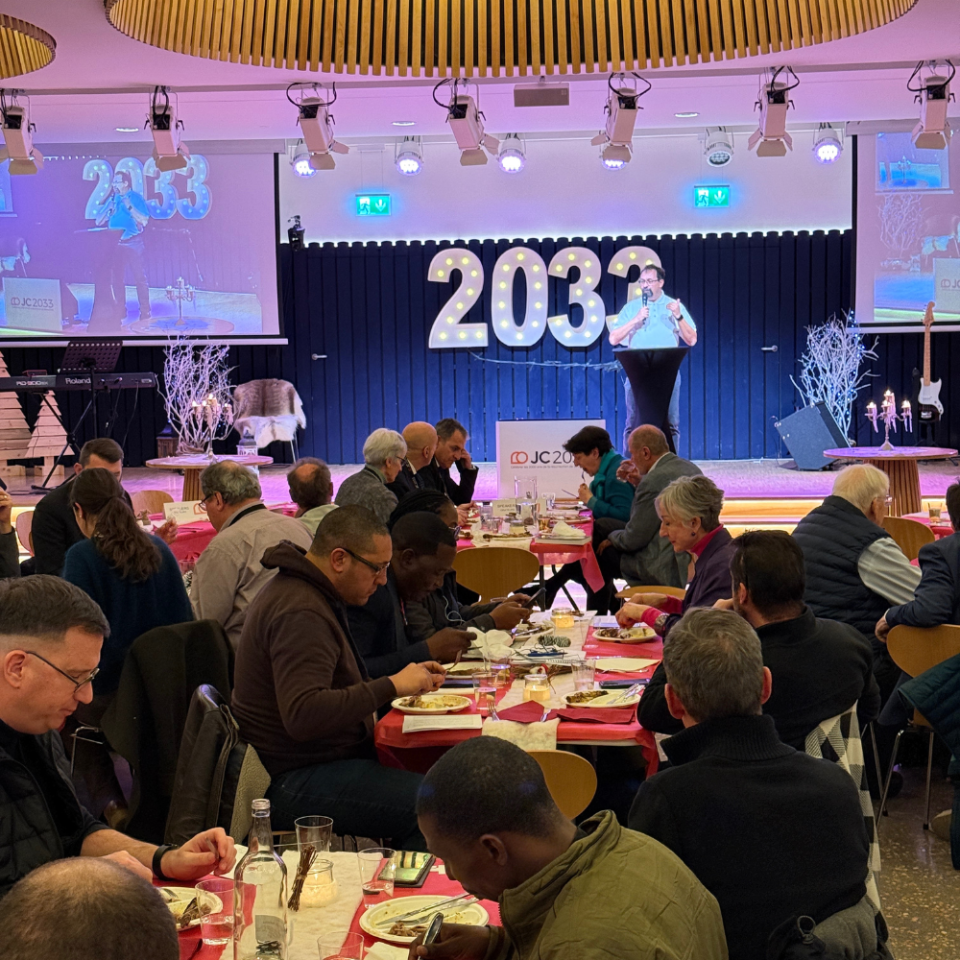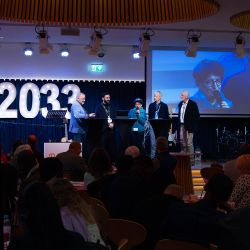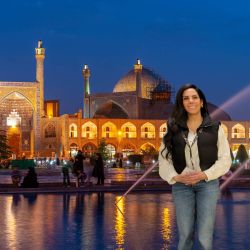More than two hundred Christians from thirty-five nations around the world (Mongolia, Pakistan, Nepal, Canada, South America, etc.) flocked to Geneva for the “Light to the Nations” Conference, which took place from February 26 to 28. Many came from regions where practicing their Christian faith is risky. Some even went into debt to pay for their trip. But all were inspired by the JC2033 vision: to prepare to celebrate the two thousandth anniversary of the Resurrection of Christ at Easter 2033. And at the same time, to bear witness to the common faith that unites Christians, whatever their denomination.
On the program for these days, which were as spiritually rich as they were relational, were a round table with leaders of various denominations, workshops, biblical input and a celebration with Interjeunes Genève. The highlight of the gathering was the Unity evening, with talks by Jerry Pillay, General Secretary of the World Council of Churches (WCC), and Elias Myrianthous, member of the Cypriot parliament and of the Orthodox movement “Easter 2025 Together”.
Divisions do not help Christian witness
“It was the Resurrection of Jesus that changed the course of history. It is the hope of the resurrection that gives us courage, strength and faith,” Jerry Pillay told a packed hall. In the same vein, the WCC general secretary deplored the divisions that exist between Christians which do not help the common witness. “Our identity is in Christ, not in our denominational identities,” he said with assurance. “However, while Christian unity is important, it does not mean uniformity,” the general secretary said, “as there are different family cultures, each church family has its own specificities.”
Referring to the 1700th anniversary of the Council of Nicaea, celebrated this year, Jerry Pillay noted that the Nicene Creed - which affirms the divinity of Jesus - has been a guiding principle for Christian communities across the centuries and regions. Even today, it invites us to a common profession of faith.
Unity at the foot of the Cross
“What does unity mean to you?” This was the question that Olivier Fleury, founder of JC2033, put to his four speakers during the round table: Catherine Riedlinger, representative of the Catholic Church; Frédéric Keller, Reformed pastor and member of the CECCV committee: Thierry Bourgeois, president of the Geneva Evangelical Network and Father Mina Hanna, of the Coptic Orthodox Church. For all of them, unity is first and foremost God's plan (according to Jesus' prayer in John 17:21). And to point to the work of Christ as the foundation of what unites us. To quote Frédéric Keller, “theological texts have never built unity; it is the gathering of Christians at the foot of the Cross”. “In 2025, we can no longer go forward alone. We must go forward together to bear witness to Jesus Christ,” confirmed Catherine Riedlinger, thanking the JC2033 initiative, which is working towards this goal.
And what are we going to put in place?
Philippe Bury, a member of the FREE management team, took part in this conference, which was held in the spacious premises of the Espace Lumen. This gathering raised the following question for him. “What can we do to mark the anniversary of the Resurrection in 2033: in my family circle, with my neighbors, in the local church or between communities in the same town, or even at the level of the canton?” He notes, “We put a lot of time and resources into marking a friend's 50th birthday or a grandmother's 80th birthday, planning these festivities well in advance. In the same way, JC2033 encourages us to stop and take the time to prepare for this event today”.
While Philippe Bury notes that interfaith relations are already concrete in various regions of French-speaking Switzerland, he insists on being more intentional and proactive in terms of sharing the Gospel at the individual, collective and even federative levels.
In this sense, the head of the Mission Circle is considering how FREE can encourage member churches to prepare for JC2033. And beyond our borders, how our federation could possibly help our partners in the south, who have fewer resources and a more difficult religious context.
Active for 9 years for JC2033
A former Reformed pastor, Martin Hoegger, leads a very active retirement. He devotes 30 to 40% of his time to promoting the JC2033 vision, in particular by meeting Christians of different denominations and persuasions in Europe. Below is an interview.
Some of the Conference participants came from countries where the Christian faith is repressed. What does this JC2033 world meeting mean to them?
It responds to the need to be in touch with Christians from all over the world. And also to focus on the essence of Christian life - the death and resurrection of Jesus Christ - which strengthens their faith. The heart of our common faith is the Resurrection.
In your view, what really promotes unity, both at the institutional and personal level?
Unity is promoted by two aspects. The effective, or doctrinal, aspect lies in the centrality of this affirmation: Christ is both true man and true God. He died on the cross and came back to life. He is not just any Christ; He is the Christ of the Holy Scriptures (the Bible), the one at the heart of the Churches' confessions of faith, the one who, out of love for us and for our salvation, took flesh in the body of a woman.
The other aspect, which I call affective, is that Christ joins us in our humanity; He became one of us so that we may love one another as He loved us, so that we may be united in His love.
You have been committed to this project to celebrate the Resurrection in 2033 for nine years. What is your driving force?
It is Christ. One day, He met me, He transformed my life! Out of gratitude and thanks, and through His grace, which gives me strength and health, I want to commit myself to Him.
Author: Sandrine Roulet FREE
Photo: JC2033
Read the article on lafree.ch (fr)



